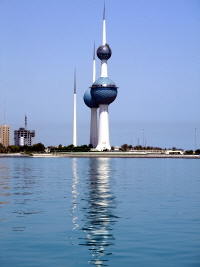Nuclear agreement for Kuwait and France
15 January 2010
Kuwait and France have signed an agreement on nuclear cooperation amid suggestions that the Gulf state is interested in buying a stake in Areva.
 |
Kuwait's landmark towers
used to store water
(Image: Deepak Gupta) |
The agreement on developing nuclear cooperation and exchanging expertise was signed by Bernard Bigot, chairman of the French Atomic Energy Commission (CEA), and Ahmad Issa Bshara, head of the Kuwaiti Committee for the Peaceful Usage of Atomic Energy, at a ceremony attended by Kuwaiti and French dignitaries.
The deal covers the peaceful use of nuclear energy both for electricity generation and for the provision of clean water (a vital consideration in the Middle East, which relies on energy-hungry fossil fuelled desalination plants for much of its potable water).
According to Kuwaiti state news agency KUNA, Bshara said that the signing of the document came as a result of talks held in February 2009 between the Amir of Kuwait, Sheikh Sabah Al-Ahmad Al-Jaber Al-Sabah, and French President Nicolas Sarkozy.
Only the day before the agreement was signed, Anne Lauvergeon, CEO of French nuclear company Areva, addressed a Kuwaiti parliamentary commission and confirmed that the company would be seeking new capital and opening up to foreign investors. Areva is looking for capital to help it to meet the anticipated expansion in the demand for new nuclear power plants. According to KUNA, Lauvergeon said that talks were taking place with potential partners at the government level, while other reports suggest Kuwait is interested in taking a stake in the French company.
Kuwait, along with Saudi Arabia, Bahrain, the United Arab Emirates (UAE), Qatar and Oman, is a member of the six-state Gulf Cooperation Council that commissioned a study on the peaceful uses of nuclear energy in 2006. Of the six, the UAE is furthest along the road towards its own nuclear power plant, having recently signed up Korea Electric Power Company (Kepco) to build four South Korean-developed APR1400 reactors in a $20 billion order, with the first plant due online in 2017. Like Kuwait, Saudi Arabia is also considering setting up a nuclear power program.
Researched and written
by World Nuclear News